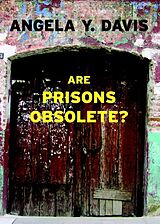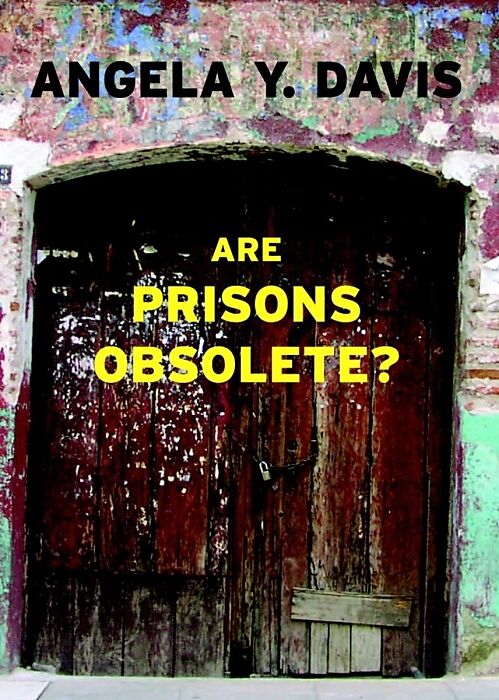Are Prisons Obsolete?
Einband:
Kartonierter Einband
EAN:
9781583225813
Untertitel:
Englisch
Genre:
Strafrecht
Autor:
Angela Y. Davis
Herausgeber:
Random House N.Y.
Auflage:
Uitgawe and Revised and Updated to Include New Dev
Anzahl Seiten:
128
Erscheinungsdatum:
05.08.2003
ISBN:
978-1-58322-581-3
Zusatztext In this extraordinary book, Angela Davis challenges us to confront the human rights catastrophe in our jails and prisons. As she so convincingly argues, the contemporary U.S. practice of super-incarceration is closer to new age slavery than to any recognizable system of 'criminal justice. Mike Davis, author of Dead Cities and City of Quartz In this brilliant, thoroughly researched book, Angela Davis swings a wrecking ball into the racist and sexist underpinnings of the American prison system. Her arguments are well wrought and restrained, leveling an unflinching critique of how and why more than 2 million Americans are presently behind bars, and the corporations who profit from their suffering. Rep. Cynthia McKinney [D-Georgia] "As Angela Y. Davis has written, prisons do not disappear problems, they disappear human beings. Prisons do not contain a criminal population running rampant but rather a population that society has repeatedly failed. Uprisings in response to the hellish conditions Black folk have been forced to live in, both in and out of prison, have been criminalized as well. In her book Are Prisons Obsolete? , Davis effectively analyzes the purpose of prisons. These prisons represent the application of sophisticated, modern technology dedicated entirely to the task of social control, she writes, and they isolate, regulate, and surveil more effectively than anything that has preceded them. An institution based on social control instead of social well-being is an institution that needs to be abolished." Colin Kaepernick, from Abolition for the People: The Movement for a Future Without Police & Prisons Informationen zum Autor Angela Y. Davis Klappentext With her characteristic brilliance, grace and radical audacity, Angela Y. Davis has put the case for the latest abolition movement in American life: the abolition of the prison. As she quite correctly notes, American life is replete with abolition movements, and when they were engaged in these struggles, their chances of success seemed almost unthinkable. For generations of Americans, the abolition of slavery was sheerest illusion. Similarly,the entrenched system of racial segregation seemed to last forever, and generations lived in the midst of the practice, with few predicting its passage from custom. The brutal, exploitative (dare one say lucrative?) convict-lease system that succeeded formal slavery reaped millions to southern jurisdictions (and untold miseries for tens of thousands of men, and women). Few predicted its passing from the American penal landscape. Davis expertly argues how social movements transformed these social, political and cultural institutions, and made such practices untenable. In Are Prisons Obsolete?, Professor Davis seeks to illustrate that the time for the prison is approaching an end. She argues forthrightly for "decarceration", and argues for the transformation of the society as a whole. Leseprobe Particularly in the United States, race has always played a central role in constructing presumptions of criminality. After the abolition of slavery, former slave states passed new legislation revising the Slave Codes in order to regulate the behavior of free blacks in ways similar to those that had existed during slavery. The new Black Codes proscribed a range of actionssuch as vagrancy, absence from work, breach of job contracts, the possession of firearms, and insulting gestures or actsthat were criminalized only when the person charged was black. With the passage of the Thirteenth Amendment to the Constitution, slavery and involuntary servitude were putatively abolished. However, there was a significant exception. In the wording of the amendment, slavery and involuntary servitude were abolished except as a punishment for crime, whereof the party shall have been duly convicted. According to the Black Cod...
Autorentext
Angela Y. Davis
Klappentext
With her characteristic brilliance, grace and radical audacity, Angela Y. Davis has put the case for the latest abolition movement in American life: the abolition of the prison. As she quite correctly notes, American life is replete with abolition movements, and when they were engaged in these struggles, their chances of success seemed almost unthinkable. For generations of Americans, the abolition of slavery was sheerest illusion. Similarly,the entrenched system of racial segregation seemed to last forever, and generations lived in the midst of the practice, with few predicting its passage from custom. The brutal, exploitative (dare one say lucrative?) convict-lease system that succeeded formal slavery reaped millions to southern jurisdictions (and untold miseries for tens of thousands of men, and women). Few predicted its passing from the American penal landscape. Davis expertly argues how social movements transformed these social, political and cultural institutions, and made such practices untenable.
In Are Prisons Obsolete?, Professor Davis seeks to illustrate that the time for the prison is approaching an end. She argues forthrightly for "decarceration", and argues for the transformation of the society as a whole.
Leseprobe
Particularly in the United States, race has always played a central role in constructing presumptions of criminality. After the abolition of slavery, former slave states passed new legislation revising the Slave Codes in order to regulate the behavior of free blacks in ways similar to those that had existed during slavery. The new Black Codes proscribed a range of actions—such as vagrancy, absence from work, breach of job contracts, the possession of firearms, and insulting gestures or acts—that were criminalized only when the person charged was black. With the passage of the Thirteenth Amendment to the Constitution, slavery and involuntary servitude were putatively abolished. However, there was a significant exception. In the wording of the amendment, slavery and involuntary servitude were abolished “except as a punishment for crime, whereof the party shall have been duly convicted.” According to the Black Codes, there were crimes defined by state law for which only black people could be “duly convicted.” Thus, former slaves, who had recently been extricated from a condition of hard labor for life, could be legally sentenced to penal servitude.
In the immediate aftermath of slavery, the southern states hastened to develop a criminal justice system that could legally restrict the possibilities of freedom for newly released slaves. Black people became the prime targets of a developing convict lease system, referred to by many as a reincarnation of slavery. The Mississippi Black Codes, for example, declared vagrant “anyone/who was guilty of theft, had run away [from a job, apparently], was drunk, was wanton in conduct or speech, had neglected job or family, handled money carelessly, and . . . all other idle and disorderly persons.” Thus, vagrancy was coded as a black crime, one punishable by incarceration and forced labor, sometimes on the very plantations that previously had thrived on slave labor.
Mary Ellen Curtin’s study of Alabama prisoners during the decades following emancipation discloses that before the four hundred thousand black slaves in that state were set free, ninety-nine percent of prisoners in Alabama’s penitentiaries were white. As a consequence of the shifts provoked by the institution of the Black Codes, within a short period of time, the overwhelming majority of Alabama’s convicts were black. She further observes: Although the vast majority of Alabama’s antebellum prisoners were white, the popular perception was that the South’s true criminals were its black slaves. During the 1870s the growing number of black prisoners in the South further buttressed the belief that African Americans were inherently …

Leider konnten wir für diesen Artikel keine Preise ermitteln ...
billigbuch.ch sucht jetzt für Sie die besten Angebote ...
Die aktuellen Verkaufspreise von 6 Onlineshops werden in Realtime abgefragt.
Sie können das gewünschte Produkt anschliessend direkt beim Anbieter Ihrer Wahl bestellen.
Loading...
Die aktuellen Verkaufspreise von 6 Onlineshops werden in Realtime abgefragt.
Sie können das gewünschte Produkt anschliessend direkt beim Anbieter Ihrer Wahl bestellen.
| # | Onlineshop | Preis CHF | Versand CHF | Total CHF | ||
|---|---|---|---|---|---|---|
| 1 | Seller | 0.00 | 0.00 | 0.00 |
